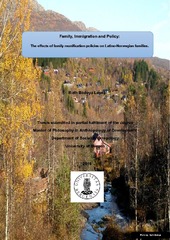Family, Immigration and Policy: The effects of family reunification policies on Latino-Norwegian families
Master thesis
Permanent lenke
https://hdl.handle.net/1956/15549Utgivelsesdato
2016-12-02Metadata
Vis full innførselSamlinger
Sammendrag
Governments issue restrictive immigration policies in their eagerness to protect their nations from the entrance of undesired' migrants. However, by toughening policies, individuals without immigrant background and their families may be also affected. For instance, this thesis illustrates how family reunification policies transform the right to have a family into a privilege, generating elitism and restricting the freedom of Norwegians in choosing a non-European partner. This situation, can also increase the number of immigrants with irregular status and intensify the idea of the undesired poor". Furthermore, this thesis also shows that more women than men from Latin America migrate to Norway under the grounds of family reunification. I suggest two possible explanations for this phenomenon: On the one hand, it may be the result of rooted macho ideas which prevent Latin American men from moving to a more egalitarian society. On the other hand, it may be the consequence of the relationship between a higher income requirement and the still present gender gap in Norway. Restrictivas políticas de inmigración son firmadas por los gobiernos en su afán de proteger a sus naciones de la entrada de inmigrantes no deseados'. Sin embargo, dichas políticas también pueden afectar a nacionales y sus familias. De hecho, esta tesis muestra como políticas de reunificación familiar transforman el derecho a la familia en privilegio, generando elitismo y limitando la libertad que los noruegos tienen para elegir a una persona no Europea como su pareja. Adicionalmente, dicha situación también puede incrementar el número de inmigrantes ilegales e intensificar la idea del pobre - no deseado'. Esta tesis también muestra que son más las mujeres que los hombres Latinos que migran a Noruega por motivos de reunificación familiar. Por lo tanto sugiero dos posibles explicaciones para este fenómeno: por un lado puede deberse a arraigadas ideas machistas que previenen que los hombres Latinos quieran vivir en una sociedad más igualitaria. Por otro lado, podría deberse a la relación entre el requisito salarial y la brecha de género que aún está presente en la sociedad Noruega.
